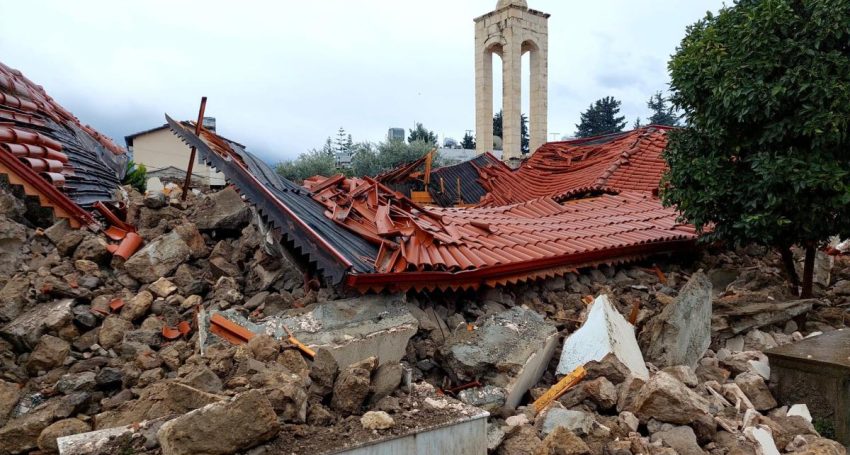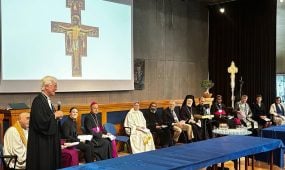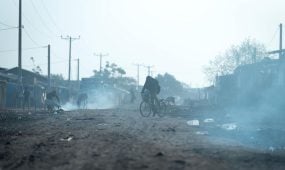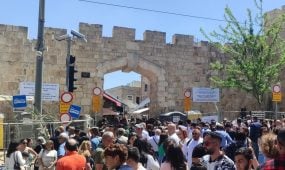Churches appeal for aid as response to Turkey-Syria earthquake expands
International
Faith-based and humanitarian groups internationally are appealing for aid and prayers as response expands in the wake of the devastating earthquake that has struck Syria and Turkey

Faith-based and humanitarian groups across the world were setting in motion appeals for aid and prayers as response expands in the wake of the devastating earthquake that struck Syria and Turkey on 6 February.
Churches in Syria are cooperating with the Middle East Council of Churches in relief efforts. The Middle East Council of Churches launched a relief appeal the same day the quake struck.
The Middle East Council of Churches continues to call on the international community and the international ecumenical family to provide urgent emergency aid to the region, and is also urging the immediate lifting of sanctions on Syria to allow access to all materials.
Churches in Syria have started to provide direct relief to the affected people.
Following the instructions of the His Beatitude Patriarch John X, Greek Orthodox Patriarch of Antioch and All the East, the Department of Ecumenical Relations and Development continues its relief and emergency response work in the areas affected by the earthquake.
In Hama, the department’s team visited both the National Hospital and the affected area in the Arbaeen district, and provided meals to civil defense personnel and rubble removal workers, as well as to the injured, their families, and the medical staff at the hospital. The team conducted a needs survey of displaced people from Aleppo and Latakia arriving to Kafarbo region in Hama, providing food, drink, blankets, and clothes, as well as distributing food baskets to affected families in Al-Sqilbia and its countryside.
In Lattakia, the Patriarchate team provided a large collection of medicines to the Tishrin University Hospital to treat the injured, food rations to the injured families arriving at the National Hospital, sets of winter clothing to the injured arriving at Assad University Hospital, and food rations at Al-Basil Shelter Center.
The team in Latakia also provided food rations to the arrivals to the halls of churches that opened their doors to receive those who lost their homes, children’s rations in the hall of Yassin Mosque, and a large number of blankets and meals to civil defense workers. The team also provided Jabla Hospital The Patriotic with blankets, sheets, sprayers, and emergency medicines.
Advertisement
In Aleppo, the team secured basic daily necessities to receive the affected families—an estimated 1,000 people—in the halls of Mar Elias Orthodox Church, in addition to securing relief supplies for the displaced people.
An engineering team in Aleppo began field visits to dozens of homes of affected families to provide assistance by repairing the cracks caused by the earthquake.
The ACT Alliance has issued an alert, calling for donations to support people in need.
As the scale of the disaster continues to be discovered, ACT members are checking in with their own staff teams, conducting rapid needs assessments, and already working to provide life-saving supplies to impacted people.
Plans are underway from other ACT members—in addition to those mentioned above—to supply winterization materials, ambulances, and other needed supplies as the extent of the need is known.
The Lutheran World Federation is calling for donations, and is working with local partner CARITAS Syria.
The number of victims continues to rise as work is undertaken to rescue survivors trapped under rubble. Many buildings collapsed completely, including hospitals and other public facilities.
Advertisement
“What is being reported at this point may only be the tip of the iceberg,” said Allan Calma, Lutheran World Federation global humanitarian coordinator.
Search and rescue operations have started in the affected areas, a race against time as the temperatures in the region are below zero. There is a need for medical supplies, food, water, shelter and sanitation.
“Temperatures are dropping and it is snowing in much of the region, with freezing temperatures expected in the coming days,” Calma added.
“Urgent access to shelter is a priority with many people fearing to shelter inside due to aftershocks. Reportedly, a lot of people are sleeping in cars and car parks.”
The situation is especially challenging in Northern Syria, a war-torn area which is not controlled by the government and is cut off from the usual aid mechanisms. The region has called for international help. Many aid organizations are affected as well, with staff and their families killed or missing.
The Middle East Council of Churches
First published on the World Council of Churches website on 8 February 2023.
Editor’s note: The Anglican Board of Mission’s Anglicans in Development (AID) is raising funds that will be sent to those most in need through the Action by Churches Together (ACT) Alliance. The ACT Alliance is a network through which AID has worked successfully in many previous emergencies. If you are in a position to donate to this appeal, please visit the Anglican Board of Mission website.





